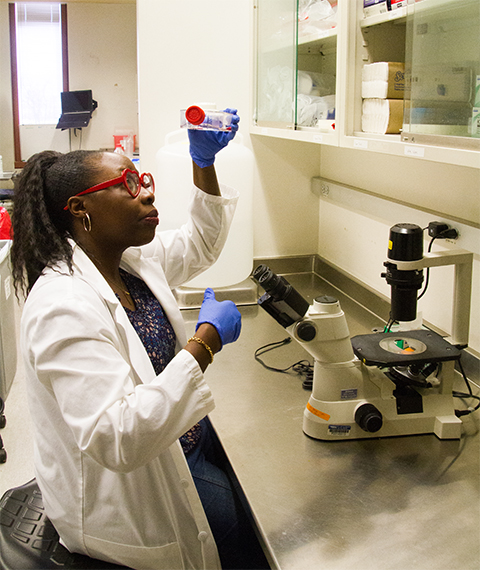From dust to discovery
In a rural Ugandan village, Elizabeth Kaweesa sat beneath the shade of towering trees, her classroom an open clearing and her workbook the sun-warmed earth where she traced her lessons in the dust. Determined to ensure her daughter received a quality education, Kaweesa’s mother held lessons at home with textbooks she purchased or borrowed.
Years later, Kaweesa transferred to a city school for her secondary education, where girls constituted less than a third in a male-dominated science class. Although Uganda encouraged girls' education, most citizens thought STEM classes were more suitable for boys, Kaweesa said. Early on, Kaweesa took science courses, but at the end of secondary school, her advisors automatically enrolled her in arts classes instead.

“My physics teacher really fought that,” Kaweesa said. “He was like, ‘She needs to be in the sciences.’ But then at the same time, I had a lot of friends who were put in the arts class.”
At the time, Kaweesa said she did not want to fight with the school administration. “So, I settled,” she said.
Kaweesa enrolled in a communications program with a focus on public relations. She participated in her first internship at a women’s hospital, a placement that helped her find her way back to the sciences and medicine.
“I was always very intrigued about the human body, especially being sick and growing up in an area where malaria was prevalent,” Kaweesa said.
Kaweesa moved to the U.S. to attend St. Edward’s University, where she earned a biochemistry degree in 2013 with hopes of becoming a physician. Despite gaining admission to medical school, she couldn’t secure loans or scholarships due to her international student status. Instead, she obtained a medical assistant license, working in hospice care and gaining clinical experience.
Feeling devastated as her peers moved on to graduate programs, Kaweesa took a chance and applied to a Ph.D. program at Oregon State University three months past the deadline. OSU accepted her promptly and worked with her to reinstate her visa.
There, she worked with Sandra Loesgen studying mensacarcin, a natural product derived from Streptomyces bacteria with potential anti-melanoma properties. She earned her Ph.D. in chemistry in 2021.
Now, Kaweesa works as a postdoctoral research associate at the University of Illinois, Chicago, working with Joanna Burdette. Her research focuses on using natural compounds to combat high-grade serous ovarian cancer, or HGSOC, an aggressive malignancy often detected only in its later stages. Even with treatment, HGSOC frequently develops chemotherapy resistance, partly due to autophagy, a housekeeping mechanism that allows cells to recycle proteins is disrupted, which therefore promotes cancer cell survival.
Kaweesa studies two plant-derived compounds: didesmethylrocaglamide, or DDR, a cytotoxic and apoptotic molecule that inhibits messenger RNA translation, and phyllanthusmin34, or PHY34, an autophagy inhibitor. She aims to use these natural compounds with unique modes of action in combination to explore new treatment strategies to combat chemoresistance in HGSOC and prevent cancer recurrence.
“I've been able to incorporate the chemistry side of things, working with different molecules and looking at cytotoxic screening,” Kaweesa said. “But also embrace the willingness to learn new techniques and the translational aspects of research.”
She received a five-year Maximizing Opportunities for Scientific and Academic Independent Careers, or MOSAIC, grant, which provided individualized coaching, networking and presentation opportunities to recipients of K99/R00 awards from the National Institutes of Health.
As she reflected on this achievement, Kaweesa credits the mentors who supported her dream of pursuing a career in scientific research.
“Mentorship is key. It’s very important. And I’ve been blessed to have amazing mentors,” she said. “They believed in me when I did not. In times when things were rough, they had faith in me.”
Enjoy reading ASBMB Today?
Become a member to receive the print edition four times a year and the digital edition monthly.
Learn moreGet the latest from ASBMB Today
Enter your email address, and we’ll send you a weekly email with recent articles, interviews and more.
Latest in People
People highlights or most popular articles

Building a career in nutrition across continents
Driven by past women in science, Kazi Sarjana Safain left Bangladesh and pursued a scientific career in the U.S.

Kiessling wins glycobiology award
She was honored by the Society for Glycobiology for her work on protein–glycan interactions.

2026 ASBMB election results
Meet the new Council members and Nominating Committee member.

Simcox wins SACNAS mentorship award
She was recognized for her sustained excellence in mentorship and was honored at SACNAS’ 2025 National Conference.

From humble beginnings to unlocking lysosomal secrets
Monther Abu–Remaileh will receive the ASBMB’s 2026 Walter A. Shaw Young Investigator Award in Lipid Research at the ASBMB Annual Meeting, March 7-10 in Washington, D.C.

Chemistry meets biology to thwart parasites
Margaret Phillips will receive the Alice and C. C. Wang Award in Molecular Parasitology at the ASBMB Annual Meeting, March 7-10 in Washington, D.C.

